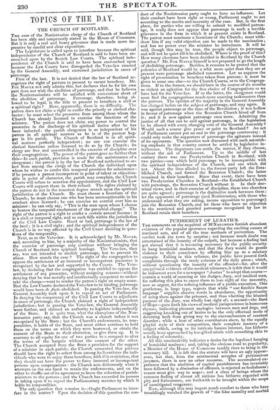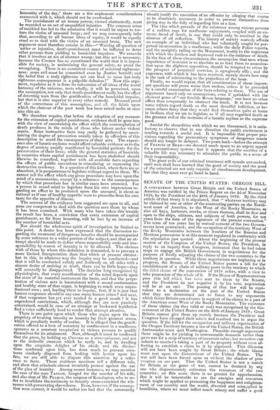PUNISHMENT OF LUNATICS.
THE comments on the acquittal of WNAIIGHTEN furnish abundant evidence of the popular ignorance regarding the exciting causes of maniacal acts, and of all the true methods of prevention. The verdict took the town by surprise ; not because much doubt was entertained of the insanity of the culprit, but because a feeling had got abroad that it is becoming necessary for the public security to bang homicidal madmen, and that the Jury would do gentle violence to their conscience by offering him up as a salutary example. Failing in this reliance, the public have poured forth complaints through the ready columns of the daily press ; which, without questioning the insanity of the offender—for, after the unequivocal evidence of the medical witnesses, it is felt that it would be indiscreet even for a newspaper "Justus" to adopt that course— contain a world of sneering at the Judges, Jury, and medical men, for suffering this plea to cause them to lose sight of the necessity, now so urgent, for the refining influence of a public execution. One gentleman, in large type, regrets that while "our forcible Saxon language" supplies abusive words in abundance, the opportunity of using them against the prisoner, and thus whetting the blunted purpose of the Jury, was wholly lost sight of; a second—the Bard of Hope—puts forth his views of medical jurisprudence in humorous rhymes, indicating pleasant analogies between men and dogs, and suggesting knocking out of brains to be the only effectual mode of deterring both from giving way to the encroachments of cerebral disorder ; while a host of other contributors show, by the equally playful style of their composition, their complete mastery of a subject which, owing to its intricate human interest, has hitherto usually been approached by less gifted minds with something akin to a feeling of solemnity.
All this unmistakably indicates a desire for the legalized hanging of homicidal madmen ; and, taking the obvious road to popularity, a Member of the House of Commons readily rises to bring in the necessary bill. It is felt that the statute will have an ugly appear- ance, but that, from the sentimental scruples of pertinacious jurymen, there is now no other recourse. The accumulated ex- perience that the abolition of capital punishments has invariably been followed by a diminution of offences, is rejected as foolishness ; reason must give way to anger ; and a class of beings whom the common feeling of almost all nations has hitherto regarded with pity and forbearance, are forthwith to be brought within the scope of unmitigated vengeance. Now, although this may impart much comfort to those who have tremblingly watched the growth of "the false morality and morbid humanity of the day," there are a few unpleasant considerations connected with it, which should not be overlooked.
The punishment of an insane person, viewed abstractedly, must be regarded as an act of unqualified injustice, The common sense of mankind has led to the admission that it would be unjust to tor- ture the victim of unsound lungs; and we may consequently infer that, according to all human ideas of equity, it would be equally cruel so to deal with the victim of an unsound brain. The new argument must therefore consist in this—" Waiving all question of 'ustice or injustice, death-punishment must be inflicted to deter other persons from yielding to homicidal impulses. We concede that it involves an act of abstract wrong; but this act is necessary, because the Creator has so constituted the world that it is impos- sible for society, in maintaining the general safety, to avoid the wrongdoing. There is no consistent course of universal righteous- ness: some evil must be committed even by Justice herself; and the belief that a truly righteous act can lead to none but truly righteous consequences is a palpable delusion !" Now this argu- ment, repulsive as it is from its subversion of all ideas of the moral harmony of the universe, rests wholly, it will be perceived, upon the assumption, not only that death-punishment really has the effect of deterring men from the gratification of the homicidal impulse, but that it is also superior to every other remedy. Demand proof of the correctness of this assumption, and all the fabric upon which the clamour of the past week has been raised melts at once into thin air.
We therefore require, that before the adoption of any measure for the extension of capital punishment, evidence shall be gone into with the view of ascertaining the effect which the contemplation of death produces in the minds of those who labour under violent mania. Some instructive facts may easily be gathered by ascer- taining the degree of precaution usually taken by offenders of this description to avoid the consequences of their acts. The experi- ence also of lunatic asylums would afford valuable evidence as to the degree of anxiety usually manifested by homicidal patients for the preservation of their lives ; while the general statistics of homicide in countries where capital punishment has been abolished should likewise be consulted, together with all available facts regarding the effects of public executions in stimulating or repressing the destructive tendency. In a question of this kind, where facts are so abundant, it is preposterous to legislate without regard to them. We cannot tell the effect which any given procedure may have upon the mind of a monomaniac, except by a reference to the consequences by which that procedure has in similar cases been attended. For a person in sound mind to legislate from his own impressions re- garding an effect to be produced upon the unsound, is about as rational as if one of healthy appetite were to prescribe from his own taste for the appetite of disease. The sources of the evidence here suggested are open to all, and none are competent to deal with the question save those by whom it has been examined. With many who have taken this trouble the result has been, a conviction that every extension of capital punishment, so far from lessening, will be met by an increase of the number of homicidal acts.
Nor should the wholesome spirit of investigation be limited to this point. A desire has been expressed that the discussion re- garding the treatment of dangerous lunatics should be accompanied by some reference to a wider portion of the subject, and that an at- tempt should be made to define where responsibility ends and irre- sponsibility by reason of insanity is to be allowed. The obvious wish of those by whom this definition is demanded, is to procure a more limited interpretation than that which at present obtains : but in this, in whatever way the inquiry may be conducted—and that it will be conducted calmly and fearlessly on all sides e ith a sincere desire of arriving at truth, there can be little hope—they will assuredly be disappointed. The doctrine long recognized by physiologists, that every manifestation of the mind depends upon the state of its material instrument the brain, and that the perpe- tration of vicious acts is inconsistent with a sound conformation and healthy state of that organ, is beginning to reach even unpro- fessional men ; and, leading them to inquire, first, if it is just that human vengeance should in any case repay human crime ? and next, if that vengeance has yet ever tended to a good result ? it has engendered convictions, which, although they are now passively entertained, would in case of an attempt at backward legislation find a voice sufficiently loud to render that attempt abortive. There is one point upon which those who argue upon the im- propriety of treating insanity as insanity lay their greatest stress, which is peculiarly worthy of notice. It is alleged that the gratifi- cation offered to a love of notoriety by confinement in a madhouse operates as a constant temptation to vicious persons to qualify themselves for its attainment. Now, although it must be confessed
that the press, by holding up OXFORD as a state-prisoner, and not as the imbecile creature which he really is, and by dwelling
upon the exquisite delights of his abode and the distinc- tions conferred upon him, has done much to prevent crea- tures similarly disposed from looking with horror upon his
fate, we are still able to dispute this assertion by a refer- ence to facts. These stubborn monitors tell a different tale, and show that criminals almost invariably protest against the use of the plea of insanity. Among recent instances, we may mention the case of the man TAYLOR, hanged for the murder of his wife, and also that of Mr. PEARCE, the surgeon of Kensington, who in or- der to invalidate the testimony to insanity cross-examined the wit- nesses with persevering shrewdness. Even, however, if the assump- tion were correct, it would be rather too bad that the community
should justify the execution of an offender by alleging that course to be absolutely necessary in order to prevent themselves from giving way to the folly of regarding him as a lion.
The idea which prevails of the existence among vicious persons of a sudden rage for madhouse enjoyments, coupled with an ex- treme dread of death, is one that could only be received in the absence of all reflection. The history of society scarcely affords an example of an individual who has voluntarily sought for per- petual incarceration in a madhouse ; while the daily Police reports, and the unsightly railing on the Monument, testify to the eagerness with which the restless and depraved rush to the embrace of death. In the face of these circumstances, the assumption that men whose impatience of" restraint is so absolute as to lead them to assassina- tion upon the slightest opposition, should be tempted to crime by the prospect of perpetual coercion, is egregiously silly ; and the eagerness with which it has been received, merely shows how easy is the task of ministering to the prejudices of the hour.
Finally, we would repeat, that all consideration of these import- ant questions will prove worse than useless, unless it be preceded by a careful examination of the facts relating to them. The use of arguments based only on assumptions, even if sprinkled with the---..„
choicest gems of" our forcible Saxon language," can have no other '- effect than temporarily to obstruct the truth. It is not because some writers regard death as the most dreadful infliction, or be- cause others fancy that they would find themselves quite at home in Bedlam, that we are to legislate as if all men regarded death as the greatest evil or the restraint of a lunatic asylum as the supreme good.
Amidst the absurdities with which we are threatened, it is satis- factory to observe that in one direction the public excitement is tending towards a useful end. It is impossible that proper pro- visions regarding the premonitory symptoms of dangerous mania should any longer be delayed. Two years back—before the attempt of FRANCIS or BEAN—we devoted much space to an urgent appeal for a precautionary system : but it appears that the sacrifice of a valuable life was necessary to stimulate the public to a sense of their responsibility.
The giant evils of our criminal treatment will remain untouched, until men shall have learned that the good of society and the good of the criminal are not only capable of simultaneous development, but that they must ever go hand in hand.



























 Previous page
Previous page